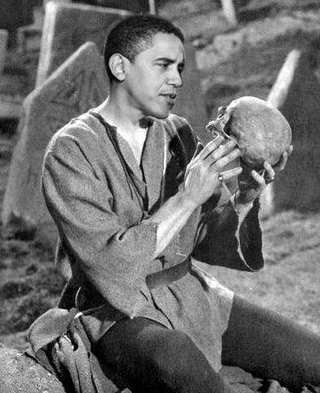LOL, from American Digest, H/T Instapundit:
Obamlet

To surge, or not to surge: that is the question:
Whether ’tis nobler in the mind to suffer
The slings and arrows of outrageous battles,
Or put down arms against a sea of troubles,
And by withdrawing end them? To retreat: to fight
No more; and by retreat to say we end
The heart-ache and the thousand natural shocks
That flesh is heir to, ’tis a consummation
Devoutly to be wish’d. To retreat, to leave;
To leave: perchance to lose: ay, there’s the rub;
For in that leaving, what defeat may come
When we have shuffled off this Afghan soil,
Must give us pause: there’s the respect
That makes calamity of a long war;
For who would bear the whips and scorns of polls,
The oppressor’s wrong, the talking head’s contumely,
The pangs of pacifists, the law’s delay,
The insolence of office and the spurns
That patient merit of the unworthy takes,
When he himself might his swift exit make
With a curt order? who would fardels bear,
To grunt and sweat under a weary war,
But that the dread that some would cry “defeat,”
That vicious accusation from whose bourn
No politician returns, puzzles the will
And makes us rather bear those ills we have
Than fly to others that we know not of?
Thus conscience does make cowards of us all;
And thus the native hue of resolution
Is sicklied o’er with the pale cast of thought,
And enterprises of great pith and moment
With this regard their currents turn awry,
And lose the name of action. – Soft you now!
The fair Nobel Committee! Wimps, in thy orisons
Be all my sins forgotten.